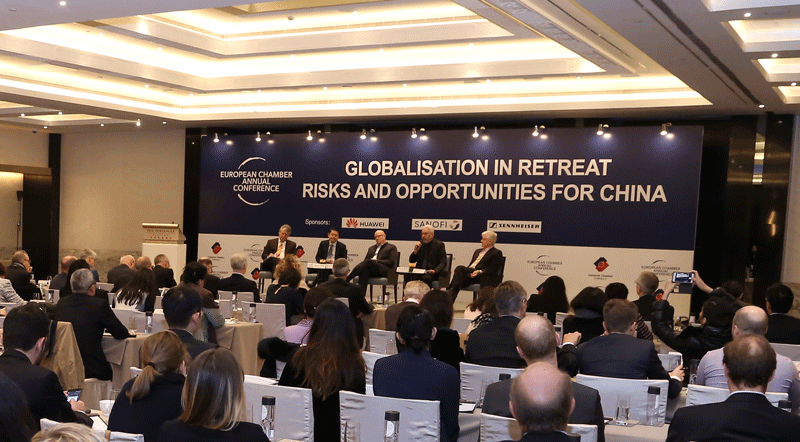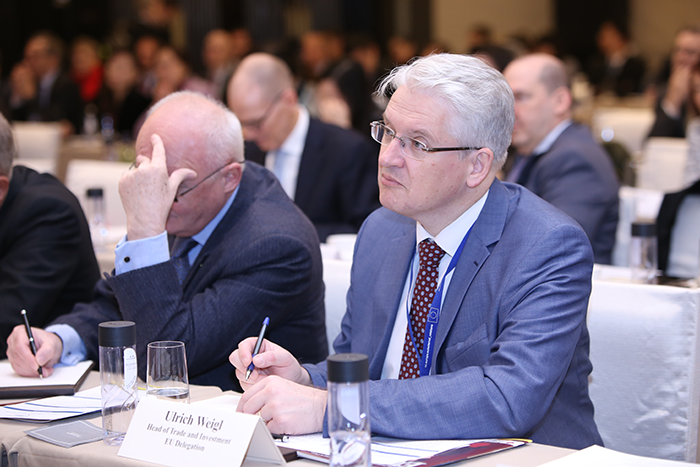 Held on 14th December, the Chamber’s annual conference, Globalisation in Retreat: Risks and Opportunities for China, was an intriguing event. Speakers that included ambassadors, business leaders, economists and academics guided the 180 attendees through the complex causes and effects of recent political developments, and presented some possible outcomes. One thing became apparent over the course of the morning – it is too simplistic to reduce the tendencies that have emerged over the last couple of years to a single concept of ‘anti-globalisation’.
Held on 14th December, the Chamber’s annual conference, Globalisation in Retreat: Risks and Opportunities for China, was an intriguing event. Speakers that included ambassadors, business leaders, economists and academics guided the 180 attendees through the complex causes and effects of recent political developments, and presented some possible outcomes. One thing became apparent over the course of the morning – it is too simplistic to reduce the tendencies that have emerged over the last couple of years to a single concept of ‘anti-globalisation’.
As the conference panels were conducted under the Chatham House rule, the following summarises some of the key discussion points and does not represent complete views of any of the panellists who participated.
Keynote speeches
In his opening speech, HE Hans-Dietmar Schweisgut, EU Ambassador to China, listed the key issues in 2016 that have mapped the future global outlook, including Brexit, Trump’s election—both prevalent themes in all panel discussions—the G20, and, to a lesser extent, the Italian referendum.
“Populist-fuelled discontent has become a major factor in the political discourse,” said the ambassador, explaining that for the first time the growing backlash to globalisation was addressed at length during the 2016 G20 Summit. Expanding on the EU-China relationship, Ambassador Schweisgut called for reciprocity in trade and investment, as it would confirm China’s commitment to fair and open trade and “would answer the concerns of those who fear that globalisation is a one-way street.”
Also delivering a keynote speech, Chamber President Jörg Wuttke conveyed a more personal narrative. Having grown up in post-war Germany, which surrendered parts of its sovereignty in the pursuit of globalisation, he lamented, “Sometimes, we should not take things for granted, like globalisation.”
On China’s position, President Wuttke noted that while “China has been the biggest beneficiary of globalisation this century”, the future relies on openness and full implementation of the rule of law. “China should not make the mistake of relying on past EU openness,” he cautioned.
Panel 1: Away from the Washington Consensus?
Contemporary China has many faces—or devils on its shoulder, if you prefer—each of which, while taking China in a slightly different direction, come together to make up the complex nation it has become.[1] China as the ‘principled pluralist’ sees that Trump is threatening to reduce multilateral cooperation and is poised to fill the vacuum – as the US steps back, China will step forward. China as the ‘herald of the high frontier’ sees the US regressing to the pre-enlightenment era, while China itself clings to science – its stance on climate change is a good example of this.
While globalisation does show some signs of retreating, it has been responsible for bringing the world rapidly forward since World War II. China has not only made great contributions to the world since its accession to the WTO, with its global GDP contribution expanding from 0.4 per cent to 20 per cent today, it has also benefitted a huge amount.
But while US-China relations were already heading for a reset—regardless of a Trump or Clinton presidency—China may well be surprised by the strength of reaction from the US business community – it is fully prepared to push back against China until reciprocity comes into play.
Alongside this, the US are abandoning the TPP, and look set to do the same with the TTIP, giving China an opportunity to upgrade its trade relationships with other regions and become a leader on trade agreements. This could be the time for China and the EU to cement their trade relationship before globalisation as we know it goes further south.
Putting aside the Washington Consensus, there exists a ‘Beijing Consensus’, which can be basically characterised as China’s commitment to globalisation. This form of globalisation, with Chinese characteristics, increasingly sees Chinese enterprises going out into the world – China manufacturing is even beginning to travel, and the FTAP, the AIIB and OBOR could potentially help to drive the world economy for the next 30 years.
This is where China’s ‘self-sufficient civilisation’ rears its head – there is a clash between the ‘global norm’ and what China sees as a normative basis – China does not accept reciprocity on US terms, as there is a suspicion that the concept of ‘reciprocity’ has been predicated on US’ interests. Working in tandem with this is China’s ‘most humiliated nation’ which feels the need to claw something back for itself.
It is highly significant that with OBOR a preference has emerged for investing in jurisdictions where there is strong rule of law – there is a natural inclination to make investments where a return can be guaranteed. This lesson is something that can inform China in terms of its own institutional reforms.

Sharing a joke: European Chamber President Joerg Wuttke with HE Hans-Dietmar Schweisgut, EU Ambassador to China
Panel 2: The forces of anti-globalisation and the impact of economic nationalism on business
Essentially it is too early to know what will happen as a result of Brexit or of Trump’s election, but these disruptive phenomena have both turned up the anti-globalisation volume.
For Trump’s part, he will soon be exposed to a whole new world, and we will see how he deals with it. There has never been so much uncertainty over fundamental policy in Washington as there is right now. Therefore we need to look to those who Trump appoints as his top advisors if we are to glean an indication of where US policy is heading. Whatever happens, the US needs to recalibrate, come up with new ideas and decide which direction it is going to go in with China. There is also no absolute certainty that TPP is dead in the water – we could see Trump resuscitating it somewhere down the road and putting his own unique stamp on it.
In terms of finding solutions to the increasing prevalence of anti-globalisation sentiment and economic nationalism, it is important to put aside the elitist language being used at the political level and hold conversations with those who feel disenfranchised. Without addressing the root causes it will continue to grow. Political leaders need to acknowledge that what matters most to people is the immediate, the local and the personal.
If things are to get back on track, trust among different stakeholders will play an extremely important role. The process could be accelerated by a convergence of global interests, where multilateral cooperation is demanded. In the not-too-distant future this could happen in the area of climate change – if the current situation continues to deteriorate, it could become a major source of popular discontent.
So what is the future of bilateral trade and investment agreements? While it is significant that China’s State Development Research Centre has acknowledged that reciprocity is a fair principle, it does not exist at the moment. But perhaps the most interesting point is that China’s ODI has outstripped FDI, and this has introduced new pressures. China investing in jurisdictions that enshrine rule of law should have a positive effect, as they can learn and grow from these experiences and take them back home, but there also a need for compromise on both sides – it should not necessarily be for China to make the first move.
Leading up to the next Party Congress there will be a huge focus on domestic stability, which will present an enormous challenge to President Xi. How they will deal with Trump is still completely unknown—even the other Republican candidates couldn’t fathom him—but we could see the hand of the hardliners being strengthened – uncertainty tends to breed conservatism after all.
Panel 3: Macro Outlook: The L-shaped ‘new normal’
China’s natural instinct to intervene and stabilise its economy resulted in a pull-back on reforms – the instability of 2015/2016 saw it move to deal with both equity and currency markets. Further capital controls can be expected, despite how bad this is for business. This is just a reality that will need to be faced in the medium term – China’s measures to stabilise have come at the expense of the markets.
It is believed by some that the so-called ‘new normal’ and the 6.7 per cent growth figure are incompatible, and that growth is actually more in the region of three to four per cent. But three to four per cent growth, it has to be said, it not bad, it is the sign of a maturing economy. This represents good and bad news – although the growth is slower than we have been led to believe, it is much more in line with what business has actually been experiencing, and as we are now closer to the floor, it won’t hurt as much if we do fall.
Despite continued overall growth, though, China has ‘recessionary pockets’, like Liaoning Province, which need to be dealt with. Places such as these, where China’s economy is heavily reliant on manufacturing by highly polluting enterprises, will suffer. In these areas the workforce needs to be re-educated and labour mobility needs to improve.
Going forward, there will continue to be a lot of push and pull between government and markets and it could be a case of one step forward, two steps back. This, on top of Trump and currency manipulation, could even signal a move away from globalisation on China’s part, as policies could become a lot more inward looking.
In terms of how Brexit is being viewed by China business and leaders, and how they will engage with the UK and the EU going forward, there is a still a great deal of uncertainty – many Chinese companies are sitting and waiting to see how the situation develops. There could also be some further political repercussions in the EU, with a number elections taking place in European countries next year, and this is adding to the overall sense of uncertainty.
We would like to thank our sponsors Huawei, Sanofi and Sennheiser.
[1] These were identified as follows: 1) the ‘self-sufficient civilisation’ – generating our own values, we march to our own drum; 2) the ‘most humiliated nation’ – conquered and despised for a century, but no more; 3) the ‘sovereign survivor’ – leave us to survive as a communist power; 4) the ‘leader of the developing world’ – responsible, developing major power; 5) the ‘last man standing’ – the West is in decline, we have deep pockets; 6) the ‘principled pluralist’ – we will end the era of unilateral Western hegemony; and 7) the ‘herald of the high frontier’ – we share in, and protect, the global commons




Recent Comments